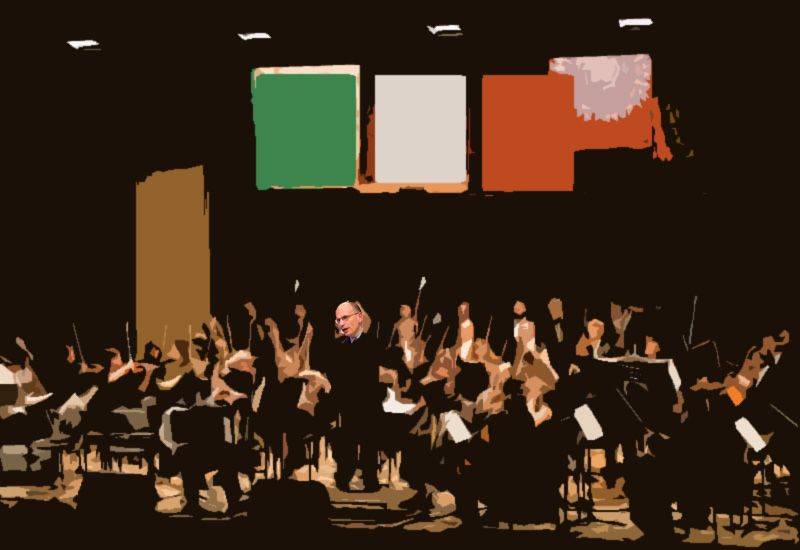The Atonal Symphony of Political Italy
ROME - Let's imagine political Italy as if a performance by a symphony orchestra playing less Mozart than modern atonal, which is by definition music that has no tonal center or key. The conductor, the economist Premier Enrico Letta, faces such unruly musicians that he can barely keep hold of his baton. In the background on stage the chorus, singing as insistently as a work by Philip Glass, warns that the number of those who've slipped below the poverty level has risen from 16% to 18%, or to almost one out of every six.
Out of this cacophony the loudest performance comes from the Grillini section of noisy percussionists. From afar their leader, Beppe Grillo, had set the tempo, and so the Grillini MPs stormed through the Chamber of Deputies, trying to overwhelm the representatives of their government. Held back by ushers and security forces, they literally got into fistfights and then occupied the hall used by a commission.
Brawling and screaming, they were protesting a bill just passed by the government, which they believe gave the Bank of Italy too much of a liquidity break (EU 7.5 billion or over $10 billion). With the mayhem came a trade of insults. A woman Grillino said a Parliamentary guard had slapped her. Her male colleague shouted that the women MPs of Letta's Partito Democratico (PD), were there only for having performed sexual services (he used the slang word for oral sex). Curiously, this incident launched a mini-debate in the Italian press over whether or not these "services" were acceptable (and hence no offense to the lady MPs) or not (hence offensive).
And on to the brass section. Their most raucous voice this week was its old trumpeter Silvio Berlusconi, last month expelled from the Italian Senate but back on stage again to launch his revived old-new political party, Forza Italia, in Sardinia. Dropping his solo performance, he began a duet with his younger new alter ego, Giovanni Toti, 45, former TV announcer for one of Berlusconi's own Mediaset channels. Introducing Toti to the audience, Berlusconi made a point of reassuring his golden-fingered oldies that, unlike Matteo Renzi of the PD, he was not dumping any of his top brass into the trash bin. He and Toti simply adored each other, "but don't think that we are gay!" This witticism brought down the house with a deafening blast of laughter and applause.
The trill of a courageous solo clarinet came from the woman who is president of Parliament, Laura Boldrini, 53, former journalist. In a plenary session of the Chamber she had forced the vote supporting the Bank of Italy--that vote which precipitated the unruly demonstration by the Grillini--in order to speed up action in Parliament so that the bill to modernize and replace the despised Porcellum election law can be passed by the end of this month. Grillo's Movimento Cinque Stelle had tried to block the vote providing bank liquidity for just that reason, so Boldrini applied a rarely applied regulation, known as "the Guillotine," which forces an immediate vote.
In his blog an outraged Grillo wrote that this meant Boldrini must "spontaneously resign." But even he was displeased with his section's wild performance. By the end of the week he was in Rome to tell his out-of-control youngsters in Parliament that they must learn to smile and turn the other cheek, even when gravely provoked. At the same time Grillo himself has done nothing to stop provocations and in Parliament is pressing ahead, fortissimo, with a tuneless resolution to have President Giorgio Napolitano impeached.
During the interval, the audience was brought back to reality by reading, in the program notes, the fairly bleak annual report issued Jan. 30 by Italy's foremost pollster, Eurispes. "Rapporto Italy 2014" showed that, on the basis of polling in December and early January, one out of three Italians, or 30.8%, has insufficient disposable income to reach the end of the month. Among those who have trouble reaching the end of the month, over half (51.8%) dip into their savings. In addition, requests for bank loans are rising 10% every year, for 31% over the past three years.
If the more unruly among the orchestra musicians would tune in to this reality, they would also take note that the distance between ordinary citizens and the institutions is widening, with 70.6% of the Italians saying that their confidence in the political institutions has declined. Government and Parliament are at the bottom of the list, with a consensus of only 16%. Confidence in President Napolitano stands at 44.2% and for the judiciary, 41.4%. Interestingly, the Carabinieri top a generally high degree of consensus for the military, with 76.3%. And the so-called "Bergoglio effect" within the Roman Catholic Church has boosted its consensus from the 37% of a year ago to today's 49%.
The larger political implications of the loss of confidence in the political parties play into the hands of what Ezio Mauro, editor-in-chief of La Repubblica daily, calls the "nichilism" of Beppe Grillo, who "proposes to the exasperated citizenry a permanent short circuit capable only of producing political cinders...with a final blast." Trying to avoid just this, orchestra conductor Letta was in Abu Dhabi Sunday hoping to solicit business. Italy's debt will drop for the first time in six years, he told an Arab TV news channel, and after five years of troubled times, he believes that. "The economy will grow by 1% this year and 2% the next."


































i-Italy
Facebook
Google+
This work may not be reproduced, in whole or in part, without prior written permission.
Questo lavoro non può essere riprodotto, in tutto o in parte, senza permesso scritto.